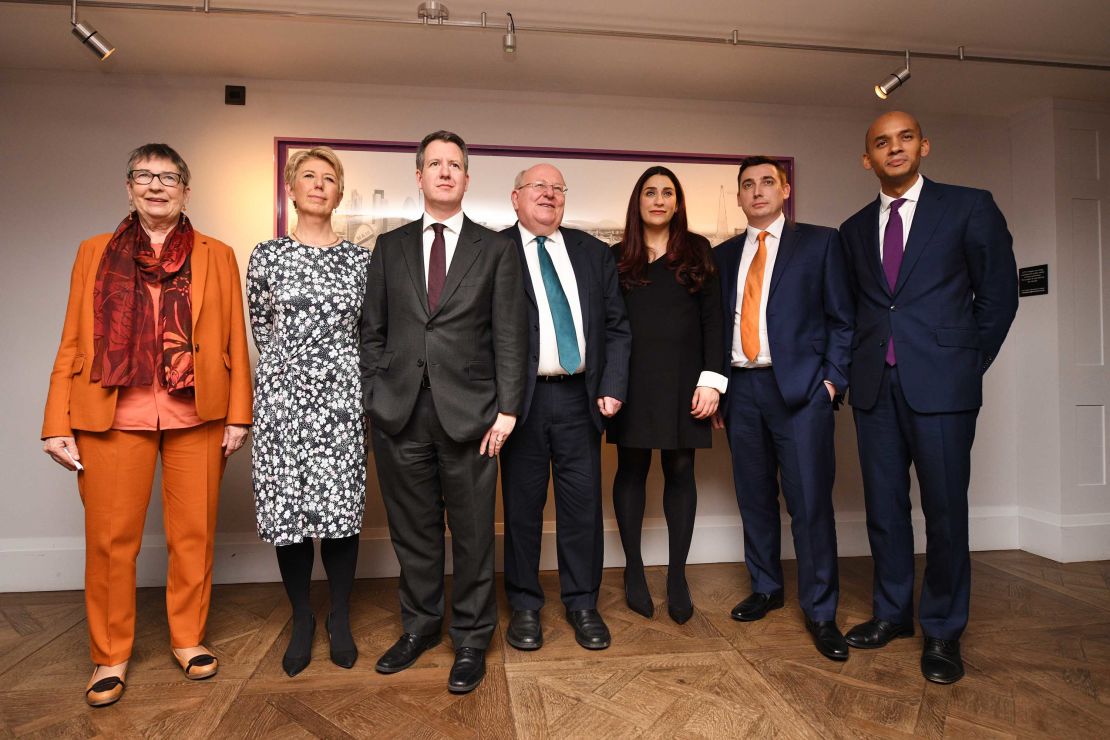A new schism opened up in British politics on Monday when seven lawmakers staged a dramatic walkout from Britain’s opposition Labour Party, denouncing its handling of a wave of anti-Semitism and a “betrayal” on Brexit.
The seven Members of Parliament, many of them longstanding figures in the party, said variously that Labour was racist, had betrayed its working-class roots and was a threat to national security. Its leader, Jeremy Corbyn, was not fit to become Prime Minister, they said.
One of the seven, Luciana Berger, said she had become ashamed of the party she’d served as a Member of Parliament since 2010. It had become “hijacked by the machine politics of the hard left,” she said.
The split reflects the mounting frustration over Labour leader Corbyn’s handling of Britain’s withdrawal from the European Union, and his alleged failure to deal with the anti-Semitism crisis that has engulfed the party.
Berger was joined by Chuka Umunna, Chris Leslie, Angela Smith, Gavin Shuker and Mike Gapes, who said that they would sit in the House of Commons as an independent group of MPs. Their defections are a stark demonstration of the fractiousness of British politics with just 39 days left to go before the UK is due to leave the EU, with no deal yet in place.

“It is not simply that our values are no longer welcome in the Labour Party; the values we hold mean that, in all conscience, we can have no confidence in the party’s collective leadership, competence or culture,” the group said in a statement.
The lawmakers also slammed Labour for failing to take a lead in “addressing the challenge of Brexit” and to provide a “coherent alternative to the Conservative’s approach.”
Prime Minister Theresa May’s Conservative Party is also facing deep divisions over Brexit, including from hard-line Brexiteers some of whom advocate a departure without a deal.
In Britain’s 2016 referendum debate, Labour campaigned to remain in the European Union, but Corbyn, who has long held Euroskeptic views, was criticized for a lackluster contribution.
The group represent a growing call within the Labour party for a second referendum. Last week, Chris Leslie said he did not understand why Labour was not pursuing a so-called people’s vote, describing the party’s inaction as “heartbreaking.”
The decision of the seven MPs to quit may force Labour to confront its position on Brexit. “There are many members of the Labour party that are deeply worried by Jeremy Corbyn’s ambivalent stance on Brexit,” Tim Bale, professor of politics at Queen Mary University of London, told CNN. “This may mean there will be more pressure in the Labour party to call for a second referendum, pressure he has so far successfully resisted.”
In a statement on Monday morning, Corbyn defended his handling of Brexit, saying he was “disappointed that these MPs have felt unable to continue to work together for the Labour policies that inspired millions at the last election.”
Read More: A Shadow Over Europe, Anti-Semitism in 2018
Corbyn’s anti-austerity message connected with voters in the 2017 general election, when Labour’s share of the vote increased. But the Labour leader’s shift to the left has also divided his own party, and he’s been accused of failing to tackle growing incidents of anti-Semitism.
Reported anti-Semitic hate incidents in the UK hit a record high in 2018, with more than 100 recorded in every month of the year. The uptick is part of a wider trend of anti-Semitism uncovered in a CNN/ComRes poll conducted in seven European countries last September.
“Labour won people over on a programme for the many not the few,” Corbyn added. “The Conservative Government is bungling Brexit, while Labour has set out a unifying and credible alternative plan.”
Britain’s electoral system makes it tough for any new political party to claim the center ground. A group that broke from Labour in the 1980s, the Social Democratic Party, fizzled after some early successes.
But small parties can nevertheless wield significant influence over larger ones. “UKIP is an example of a party that won sufficient votes to frighten the Conservatives into changing its policy very significantly, ultimately forcing a vote on Brexit,” Bale said, adding that the group of rebel MPs could push Labour to a more centrist position.
For the splinter group to turn into a successful political party, it would need three things, Bale said: More Labour MPs to join it, at least some Conservative MPs to follow suit, and either to co-opt or absorb the centrist third party, the Liberal Democrats, to give it the kind of infrastructure and membership a credible party requires.
Whether that happens or not depends in part on Brexit and whether Corbyn is seen as enabling Britain’s departure from the EU.
Read More: Theresa May suffers another humiliating Brexit defeat
As the clock ticks down to March 29, British politics seem to be drawn increasingly around what side of the Brexit debate you are on and less along party lines.
“People’s political identities have been changing for two to three decades now, left and right no longer has the resonance that they used to have for many voters, and Brexit, whether you are pro-leave or pro-remain, seems to be in many ways a more important identity,” Bale said, explaining that you would expect to see a fragmentation of the party system based on that.
“But we still may be stuck with two main parties that don’t even represent the people that vote for them, partly, well, because of the antiquated system we have in the country.”


















